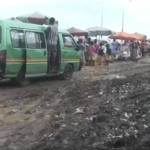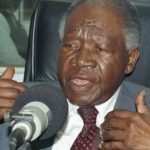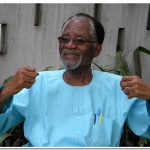Femi Akomolafe interview with Polish MP John Abraham Godson
Posted by By Akogun Akomolafe at 7 May, at 14 : 32 PM Print
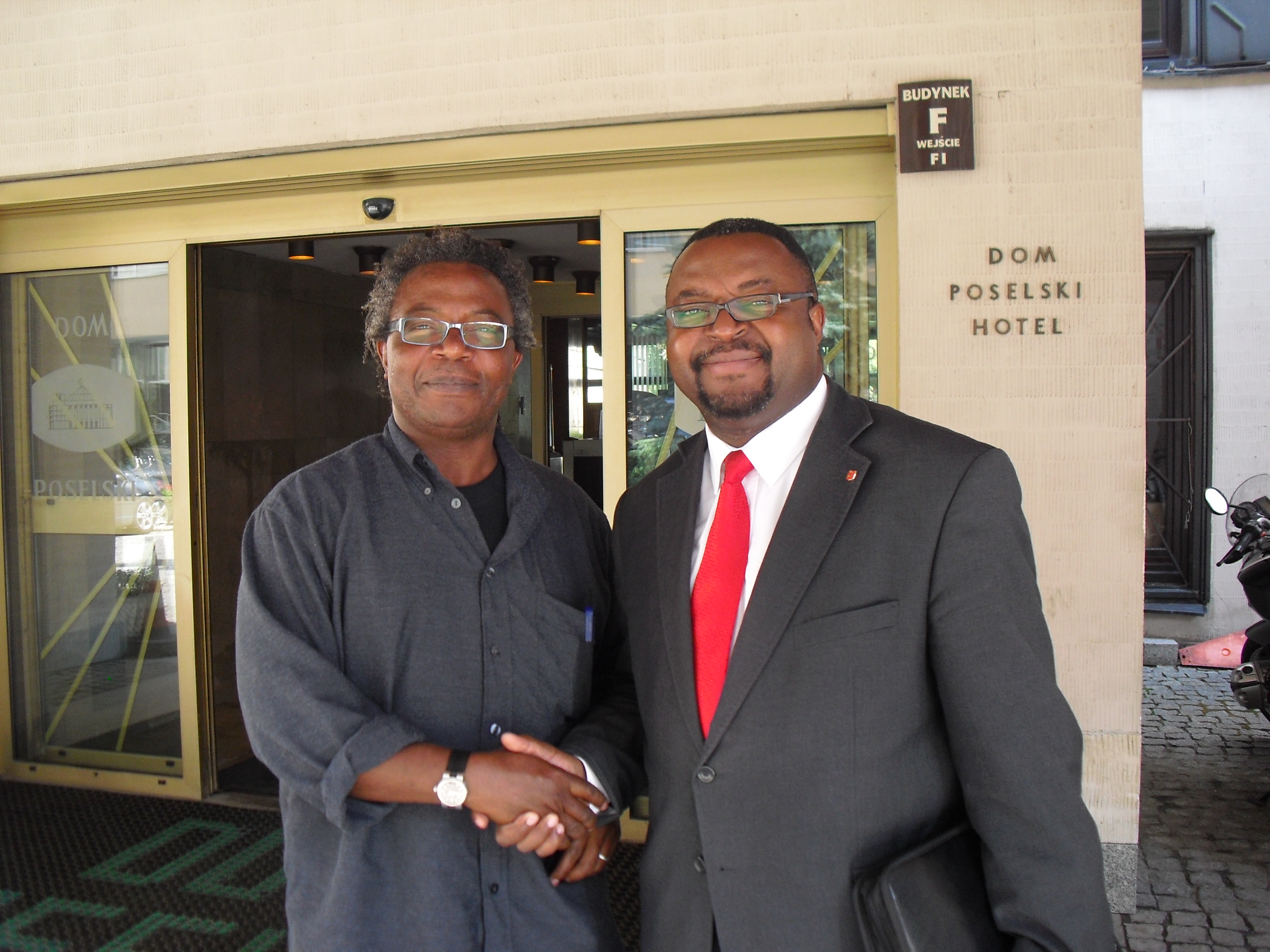
Warning: count(): Parameter must be an array or an object that implements Countable in /home/alaye/public_html/wp-content/themes/Video/single_blog.php on line 56
[Warsaw, Thursday, 18 August 2011. Published in the New African magazine, November 2011 edition.]
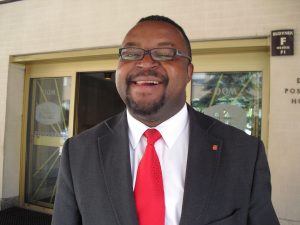
Even for professed atheists and agnostics, some things so defy logical explanations that only the word ‘miracle’ could describe them.
Take the case of Mr. Abraham John Godson, the Nigerian-born member of the Polish parliament.
How to explain such logic-defying phenomenon of a black man getting elected into the parliament of a rigidly white, homogenous society like Poland?
For those that have not been there: It is quite possible to walk the streets of Warsaw, the Polish capital city, the whole day (as this writer did in the second week of August 2011) without seeing a single non-European face.
Ok, if you branch off the major streets into some side corners, you might encounter some Asians running their own definitions of Chinese Restaurants. But in Warsaw, as in most of Poland, a black face is as scarce as the proverbial chicken teeth.
According to the statistics I gathered, there are about 4,000 Africans in the country of thirty-eight plus million people. Most of the Africans are said to be students, some of whom came long time ago on government scholarships and for one reasons or the other decided to make Europe’s eight (in terms of size: 312,679 sq. km) and seventh (in terms of population: 38 million) largest country their home.
Some of the Africans are those that got stuck on their way to other (more appealing) destinations in Europe. We then have the footballers who are busy looking for opportunities to ply their trade.
But even if all of the Africans have voted and had given all their votes to their kindred, their figure is so pathetically statistically-insignificant that they couldn’t have gotten one of their brothers into the Sejm – the polish parliament.
Let Wikipedia explain: “The Sejm [sɛjm] is the lower house of the Polish parliament. The Sejm is made up of 460 deputies, or Poseł in Polish (literally ‘Envoy’). It is elected by universal ballot and is presided over by a speaker called the Marshal of the Sejm (Marszałek Sejmu).
Before the 20th century, the term “Sejm” referred to the entire three-chamber Polish parliament, comprising the lower house (Chamber of Envoys; Polish: Izba Poselska), the upper house (Senate; Polish: Senat) and the King. It was commonly termed a three-estate parliament. Since the Second Polish Republic (1918–1939), the term “Sejm” has referred only to the lower house of the parliament; the upper house is called the “Senat”.
It is equally significant that at a time that fascist elements in several European countries are clamouring to take ‘their countries’ back from immigrants, and cranky Tea-Partyers like Donald Trump are asking President Obama to produce a birth certificate, a homogenous country like Poland will decide to elect an African immigrant a member of its parliament.
Miracle is exactly what happened when on 14 December 2010 John Abraham Godson, the Nigerian-born, now Polish citizen was sworn in as the first black member of Poland’s parliament.
Understandably, the entry of Mr. Godson into the Polish parliament caused quite a stir in the overwhelmingly white country.
Born on 25 November 1970, in the Eastern Nigerian town of Umuahia, Mr. Godson (named Godson Chikama Onyekwere) moved to Poland in 1993, and in 2001 became a Polish citizen. He married a Polish woman and they have four children.
Beginning with the B. SC he earned in agronomy from the University of Abia State, Mr. Godson holds numerous academic degrees including one Masters degrees in Human Resource Management and Development and another one in International relations. He is reportedly in the process of earning two doctorate degrees at the University of Warsaw (political Science) and University of Lodz (Management). He is also participating in the joint MBA/Master of Science in Professional Communication (MSPC) run by Clark University and the Łódź Academy of Management.
Mr. Godson was a senior lecturer at the Technical University of Szczecin and at Adam Mickiewicz University, Poznań. He is also a guest lecturer in various institutions of higher learning in Poland and abroad. He is also the president of the African Institute in Poland.
He first dabbled into politics when he served as a councillor in the central polish city of Łódź (Lodz in English and pronounced wooch). Lodz translates literally as ‘boat,’ and it’s Poland’s third largest city
A member of the centre-right, Christian Democrat Platforma Obywatelska, Civic Platform Party, Mr. Godson took up the parliamentary seat vacated by a party colleague, Hanna Zdanowska, after she became mayor of Lodz.
His supporters believe he is Obama re-incarnate and rent the air of his campaign stops with shouts of: “Vivat! Vivat Polski Obama!” (“Long live the Polish Obama!”).
Twice beaten by racist youth, Mr. Godson blamed his assault on plain ignorance of other cultures rather than outright racism.
Femi Akomolafe went to interview him at the Dom Poselski Hotel in Warsaw where Polish parliamentarians and ministers meet and chill out.
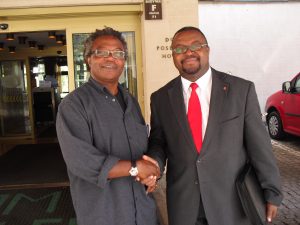
THE INTERVIEW
- Please, tell us, who is John Abraham Godson?
Ans: Abraham John Godson is a simple man of deep faith; a family man who is passionate about what he does and tries to do his best in service of his people. I am also a man with profound intellectual curiosity who believes in the advancement of human progress.
2. You were born in Nigeria and you grew up there. Can you describe for us the type of family into which you were born?
Ans: I am from a typical African house with a large extended family. Luckily for me I was born into a family of educators. My father was a secondary school principal and my mother was a primary school head mistress. My parents are rather well-off and they are strict disciplinarian. They do not believe in spoiling their children. Mine was a strict, disciplined family where every member of the family was assigned a task for which he is solely responsible.
I was responsible for cooking for the family. I learned a lot traditional Igbo cooking from my mother and even today, I remain a very good cook.
Aside that, we were taught values such like honesty, responsibility, respect for elders and authority, hard work and sense of justice.
What my parents also inculcated in us was the sense of service to one’s community. They believed and they taught us that those that are better off owe a responsibility to help the less-endowed.
Those were lessons well-learned and they have remained my guiding principles.
3. Can you tell us some of the things you still remember from your early years?
I do not want to sound nostalgic, but I remember a great deal of the happy moments we had. I remember the total sense of security. The whole town was our oyster and we felt completely at ease and secured. I also remember the sense of community where people share the joys as well as the sadness. I remember the fun, the laughter, the joys we had playing, the festivals. I remember so many happy memories. Of course, there were sad moments, but overall, I had a very good and rewarding youth.
4. What can you tell us about your education and career?
I had a very good and solid education. Those were the days when education in Nigeria was at par with the best in the world and high premium was placed on quality education. It was the period when graduates of Nigerian universities could compete with the best in the world.
I studied Agronomy at the university after which I served in the mandatory Youth Corp scheme in Nigeria. I later worked at the famous International Institute of Tropical Agriculture (IITA) at Ibadan in Western Nigeria. I earned one of my Masters degrees in the United States and the other one here in Poland. I am working towards my Ph.D.
During my school days, I was very active in the International Fellowship of Evangelical Students (IFES) and it was through them that I got posted to Poland as a Missionary. That was in the year 1993.
5. Can you tell us what Missionary work entail?
Ans: Missionary work involve working very closely with the ordinary people; it means relating to them at their levels – you listen to them. You offer advice and you counsel them to the best of your abilities.
The most important thing is to let them see you as a trustworthy and a loyal friend on whom they can count on for support at all times.
Contrary to popular conception, missionary works involved more than administering to the spiritual needs of people – that definitely is an essential part but it involves much more than that.
We are doctors, counselors, psychologists, psycho-analysts, spiritual-guides, brothers, fathers all rolled into one.
6. Many people will find it incongruous that an African is a Missionary in Europe. Our idea of a Missionary is that of a European going to minister to Africans in Africa, now we have you, an African came to Europe to minister to the spiritual needs of Europeans. How did the Polish people react when you started your missionary work?
Ans: Actually, I was not the typical Missionary you read about in books. I was basically working with students at the University where I was a lecturer. My work was essentially that of a Student mentor.
It was, of course, a novelty for both parties. But like most humans, they relate to those that relate to them at their levels. I am happy that the people I met did their best to make me feel most welcome. It helped tremendously that I did my best to study and understand and adapt myself to their ways of life.
7. Can you share with us some of your experiences as a new immigrant in Poland?
Ans: The short answer is that it was difficult. Like anyone who finds himself in a new environment, the beginning is strewn with difficulties and it’s always tough going. There are new languages to cope with; new customs and norms to learn. There is the mercilessly cold weather to contend with and there is new, alien territory to explore and discover. There is also the lack of family support. It is not easy to be surrounded by new, unknown faces, etc, etc.
But with determination, one forges ahead and makes the best of the new situation. We humans are very adaptive, you know.
It is a choice of giving up in the face of adversities or rising up to the occasion and making the best use of the new space, environment and opportunities that presented themselves.
8. Apart from the language which, even the Polish people themselves admit, is not among the easiest in the world to learn, what are some of the challenges you faced?
Ans: To be honest, at the beginning I missed the traditional Igbo food the most. I told you that I was in charge of the family culinary department where it was my duty to prepare delicious and spicy food.
Suddenly, I find myself having to survive on totally foreign food with unpronounceable names. In my part of Nigeria, people enjoy isi-ewu (goat head) as a delicacy; here people will think that something is wrong with you if you start to attack the head of any animal.
9. How about racism, how have you coped?
I hate to use the word racism because I believe that it has been overused. I prefer the term ‘low inter-cultural competence,’ which I believe is responsible for most acts we blame on racism. There are lots of mis-guided and ill-informed people who believe that they are superior to other because of their religion or tribe or race.
My own take is that you should let your superiority manifest itself in positive ways. You don’t need to prove a thing if you have confidence in yourself and in your abilities. It simply means that you have no confidence in your own superiority if you have to beat people up or act nastily in order to prove it.
People with low-intercultural competence tend to hide behind race or tribe to mask their own personal inadequacies.
10. You were reported to have been a victim of two attacks, what happened?
Ans: Yes, that’s true. On the two occasions, it was an attack that was totally unprovoked and rather thoughtless. But I have put it behind me and moved on.
11. You are also very active in the African community in Poland; can you tell us what are some of the activities you are engaged in?
Ans: The truth I have discovered is that we Africans only seem to appreciate our Africaness when we are outside our continent. This is very sad and could be partly responsible for some of the problems besetting us.
Back in Africa, we see ourselves first through our nations – as Cameroonians, Kenyans, Nigerians etc, etc. We then reduced ourselves further into Zulu, Peul, Mande, Yoruba, Ashanti, Kikuyu or what have you. We compound this by further dividing ourselves along religious lines.
But outside of Africa, we tend to discover that we share so much in common and we get along very, very well. Here in Poland, we see ourselves as brothers and sisters and we relate to one another with little distinction on tribe or country or religion.
Through the African Institute in Poland of which I am the President, we organize events to secure the bonds of brotherhood among our people. We also try to help our people who find themselves in difficult situations, and we help newly-arrived Africans to find their ways in the new environment they find themselves. Through the Institute they get pertinent information to ease their lives into the Polish society.
We also have the Orientation Week we organize every October to sensitise new students. There are also social and cultural activities.
There are about 4,000 of us here and we try to help one another as much as possible. We provide information to new African students and immigrants and try to steer them in the right direction.
12. Many Africans in the Diaspora say that they have problem reconciling their identities; have you resolve yours. How?
I consider myself a Polish of African descent (Polish-African if you like). I have chosen to make my home here in Poland, so I consider myself a full-fledged Polish citizen with all the privileges, duties, responsibilities and obligations it confers.
13. What are the main challenges Africans in this country face?
Ans: Mostly it is the cultural cum language challenges. It is a difficult language and sadly many Africans seem to give up on it. Poland is very, very different from Africa. It is even very different from most European nations like France and the UK which many Africans, for colonial and historical reasons, consider second homes.
But those that scale the hurdles have found that the Polish people are rather welcoming and very accommodating to foreigners.
14. Let’s talk about your politics. What drew you to politics?
Ans: I think that the short answer is that it is natural progression from the teaching and the evangelical work I did. All three professions involved dealing with people and trying to help people solve their problems.
15. How would you describe the experience so far?
Ans: It has been very rewarding, despite the challenges. I was brought up to be passionate about whatever I choose to do. It makes you feel happy to see that you are part of the process whose decisions directly impact positively on the lives of several people.
16. Poland is a country of close to forty million people, there are said to be about four thousand Africans in the country. For those that do not believe in miracles, how would you describe your meteoric rise in the Polish politics?
Ans: Ah! Miracles help only those that prepared themselves to receive it. I am a very determined person. When I came here, I was very determined to succeed and make it at my new home.
With all modesty, I can say that the modest successes I’ve achieved are due to two important factors: determination and hard-work.
First, I courted my constituents assiduously. We have given over 60 scholarships to local students and we are also involved with community activities.
It came as no surprise when my constituents supported me when I launched my political career.
I served diligently as a city councilor before I became an MP. And today, here we are.
17. Today, you are a member of the Polish Parliament as the first Black member. Poland is very homogeneous country, with 97% of population being Polish. The number of Africans is statisticallly insignifigant. Yet, you managed to become a member of parliament. How did it happen? Who are your constituents?
Ans: My constituents are my people in Lodz. They trusted me enough to make me a city Councilor and supported me to become their representative in the parliament.
18. Many Americans still find it difficult to reconcile themselves to the election of President Obama. They formed the Tea Party because they say that they want to take their country back. Do you have people who find it difficult to see a Black face in the Polish Parliament; do you have a Polish equivalent of the Tea Party?
Ans: Here we also have pockets of ultra-nationalistic Native Poles who cannot reconcile themselves to seeing me at the Sejm and they make noises now and then, here and there but, generally, most Polish people ignore them.
Their times have passed. Luckily though, they do not enjoy the same high profile the Tea Partyers enjoy in the US.
19. What are some of the issues that are dear to you; what agenda do you push in the parliament?
Actually, I have five issues that are very dear to my heart and which I am passionately pushing through the parliament. Among them is development of Lodz, my constituency. I also believe in care for the poor, the elderly, women and children. The promotion of science and technology is also high on my agenda as is the provision of high-speed internet connectivity throughout the country. The idea is to have internet hotspots all over the country. We have already started the project in Lodz and we are pushing for the parliament to make it nation-wide. I am also passionate about promoting Polish-African relations which I believe could be improved tremendously.
20. Having lived in other societies where things appear to work what, in your opinion, are we doing wrong in Africa that makes our problems appear so intractable?
Ans: Our problems in Africa stemmed primarily from two factors: Failure of Leadership and Indiscipline.
First, we have rulers, not leaders in Africa. We have people in government who appear not to have a clue as to what they want. They have no vision as to where they want to take the country. They see governance as a hit-and-miss thing that does not require vision, planning and rigorous monitoring of policies.
We then have the problem of Indiscipline, which is also closely related to the first. You see here, people have disciplined themselves to obey laws, rules and regulations. No matter what an individual thinks, as soon as a law is enacted, he obeys it.
In Nigeria, and most of Africa, people see laws as mere suggestions. We then have the problem of people believing that the laws are not made for them, but for lesser mortals. Of course, this creates indiscipline in society.
It is impossible to make any progress in an undisciplined environment; that’s what we have to learn.
21. I will ask you to share with us some ideas you have on how we can begin to move the agenda of the African continent forward? Can you share with us some of your insights?
Ans: Apart from the two factors I mentioned before, I will add education. You see, another thing is that we do not take education seriously in Africa. Look, my city, Lodz, has twenty universities. How many universities do we have in Lagos, Nigeria’s largest city? The city of Warsaw boasts of forty universities. Warsaw is a city of two million people. And we are talking about high-grade universities which produce world-class scholars, scientists, mathematicians, technologists, writers etc.
What we have in Africa are glorified high schools masquerading as universities and churning out students versed only in the rote system. We need a total revamp of the education system in Africa.
Only education, discipline and good leaders with vision can save Africa.
22. You have planted your roots here in Poland, but do you still go to Nigeria or is Africa for you an abandoned project?
Ans: I have planted my roots here but Africa can never be an abandoned project for me. My extended family still lives there and we have discussions all the time. I am fully abreast of developments in Africa.
I also have extensive connections through which I try to chip my bits in advancement of the continent’s progress.
At the parliament, I am the Chairman of the Polish-African Committee through which we try to broaden Polish-African relations. And soon we shall start to exchange delegates with many African countries with the aim of fostering better relations between Poland and Africa.
Both sides can benefit enormously from each other but it will require a change in attitudes and mentality. The rest of the world should jettison the image of Africa that constantly requires aid. Africa should also stop seeing itself as a beggar continent.
There should be a paradigm shift from aid to trade. Africa has enormous resources with which it can trade itself into progress; the rest of the world should recognize this. It would be mutually beneficial.
A good example is education: Poland has excellent facilities for higher education and it could make serious money by training Africans who could also benefit immensely from high-grade education. A win-win situation for both sides.
23. What plans do you have for the future?
Ans: My immediate plan is to continue to serve my constituents as faithfully and as diligently as possible. There are still lots of challenges we are addressing. I am running again for parliament in the coming elections in October. In the future I might decide to run for the Mayorship of my city, Lodz. I might also decide to run for the European Parliament. Everything is possible.
24. And what do you think are the chances of a Black Polish President?
Ans: Ah, ah! I am afraid that’s a miracle that’s never going to happen in my case. As you know, many countries have laws that say that only native-born citizen can become president. Since I was not born here, I am afraid that in my case we are not going to see another Obama Miracle.
About the Author
Femi Akomolafe is a passionate Pan-Africanist. A columnist for the Accra-based Daily Dispatch newspaper and ModernGhana, and Correspondent for the New African magazine, Femi lives in both Europe and Africa and writes regularly on Africa-related issues for various newspapers and magazines.
Femi was the producer of the FOCUS ON AFRICANS TV Interview programme for the MultiTV Station.
He is also the Man and Machine Coordinator at Alaye Dot Biz Limited, a Kasoa-based Multimedia organization that specializes in Audio and Video Production. He loves to shoot and edit video documentaries.
His highly-acclaimed books (“Africa: Destroyed by the gods,” “Africa: It shall be well,” “18 African Fables & Moonlight Stories” and “Ghana: Basic Facts + More”) are available for sales at the following bookshops/offices:a
- Freedom Bookshop, near Apollo Theatre, Accra.
- WEB Dubois Pan-African Centre, Accra
- Ghana Writers Association office, PAWA House, Roman Ridge, Accra.
- Afia Beach Hotel, Accra
Where to buy them online:
On Lulu Books:
18 African Fables & Moonlight Stories https://goo.gl/Skohtn
Ghana: Basic Facts + More: https://goo.gl/73ni99
Africa: Destroyed by the gods: https://goo.gl/HHmFfr
Africa: It shall be well: https://goo.gl/KIMcIm
Africa: it shall be well
on Kindle books: https://www.createspace.com/4820404
on Amazon books: http://goo.gl/QeFxbl
on Lulu Books: https://goo.gl/SQeoKD
Africa: Destroyed by the gods
on Kindle books: https://www.createspace.com/4811974
18 African Fables & Short Stories: https://goo.gl/s9tWAf
on Amazon books: http://goo.gl/1z97ND
on Lulu Books: http://goo.gl/KIMcIm
My Lulu Books page: http://www.lulu.com/spotlight/FemiAkomolafe
Get free promotional materials here:
- Africa: it shall be well: http://alaye.biz/africa-it-shall-be-well-introduction-in-pdf/
A FREE Chapter of ‘Africa: It shall be well’ can be downloaded here: http://alaye.biz/africa-it-shall-be-well-a-free-chapter/
- Africa: Destroyed by the gods (How religiosity destroyed Africa) http://alaye.biz/africa-destroyed-by-the-gods-introduction/
A FREE Chapter of ‘Africa: Destroyed by the gods’ can be downloaded here: http://alaye.biz/africa-destroyed-by-the-gods-free-chapter/
Femi’s Blog: www.alaye.biz/category/blog
Websites: www.alaye.biz ; www.akogun.tv
Femi on Amazon https://www.amazon.com/author/femiakomolafe
Femi Akomolafe’s Lulu Books page: http://www.lulu.com/spotlight/FemiAkomolafe
Twitter: www.twitter.com/ekitiparapo
Facebook: https://www.facebook.com/FemiAlaye
Gmail+: https://plus.google.com/112798710915807967908;
LinkedIn: www.linkedin.com/in/femiakomolafe;
YouTube Channel: https://www.youtube.com/user/fakomolafe
Email: fakomolafe@gmail.com
Profile on New African magazine: http://newafricanmagazine.com/tag/femi-akomolafe/

